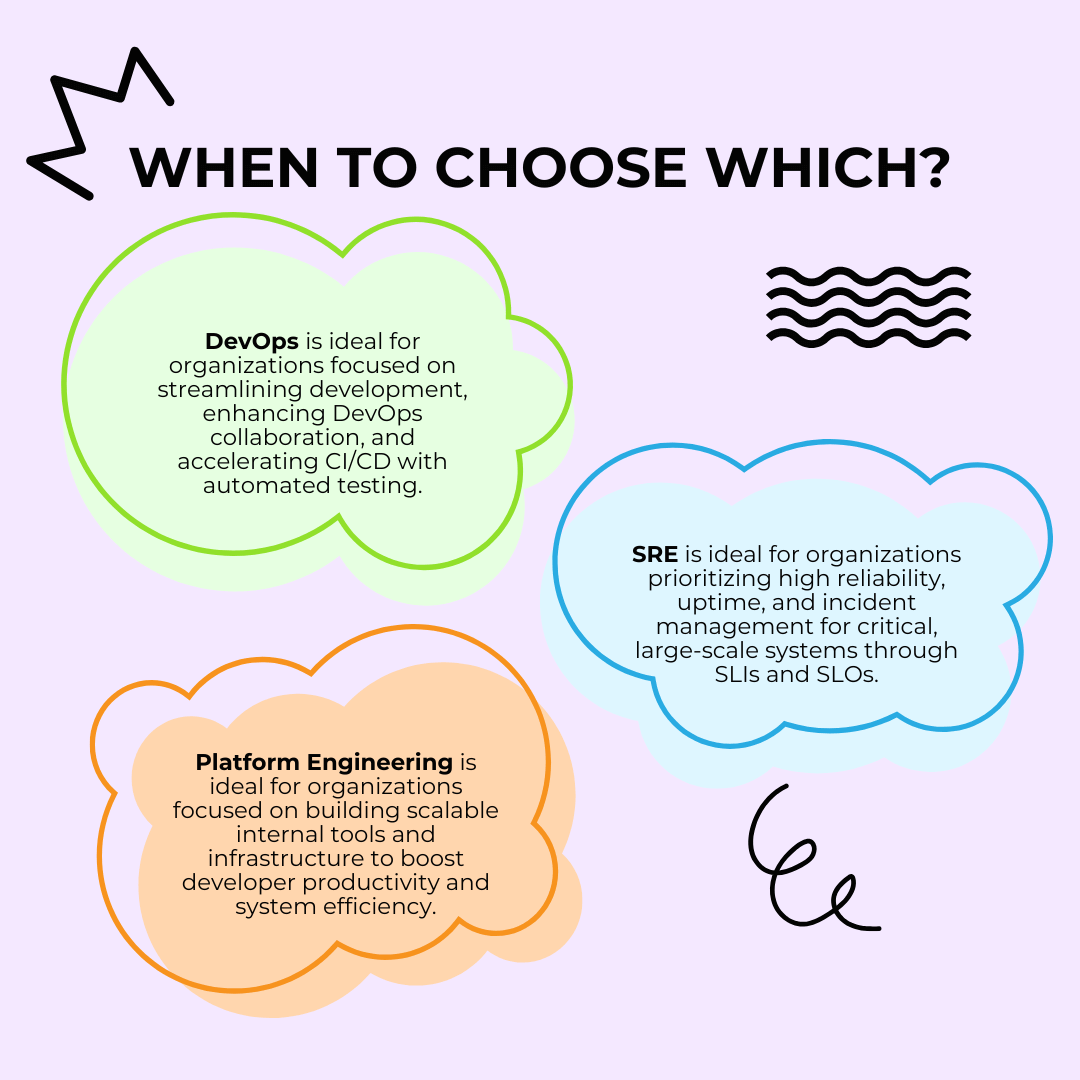Introduction
As businesses embrace modern software practices, many face confusion distinguishing between DevOps, SRE, and Platform Engineering. This misunderstanding often results in inefficiencies, misaligned efforts, and operational bottlenecks, hindering innovation.
By grasping the distinct roles and their unique benefits, companies can avoid these pitfalls. In this article, we clarify key differences, explore the advantages of each approach, and provide guidance to help you choose the best fit for your organization, driving productivity and success in today’s fast-paced tech landscape.
Understanding DevOps, SRE, and Platform Engineering
To effectively differentiate between DevOps, Site Reliability Engineering (SRE), and Platform Engineering, it's essential to grasp their core principles and historical development.
DevOps developed from the need to connect development and operations teams, encouraging collaboration between traditionally separate functions. Its objective is to eliminate silos and improve efficiency and workflows.
DevOps emphasizes automation, continuous integration and delivery (CI/CD), and rapid deployment to accelerate software development cycles while maintaining high quality. This approach aims to streamline workflows and reduce friction in deploying code, thereby facilitating faster releases and more reliable software.
Site Reliability Engineering (SRE) was developed by Google to combine software engineering principles with IT operations. SRE focuses on ensuring the reliability, availability, and performance of services through a set of well-defined metrics and objectives.
The core principles focus on tracking service level indicators (SLIs), establishing service level objectives (SLOs), and outlining service level agreements (SLAs). SREs are responsible for incident response, system monitoring, and capacity planning, ensuring that systems meet predefined reliability targets while continuously improving performance.
Platform Engineering involves creating and maintaining the underlying infrastructure and tools that support development teams. This discipline focuses on building scalable platforms and improving the developer experience by providing robust tools and environments for software development and deployment.
Platform Engineering includes responsibilities like infrastructure management, tool development, and ensuring that systems are reliable and efficient for developers to use.
Each of these disciplines evolved to address specific challenges in the software development lifecycle. Understanding their unique contributions and historical context helps in leveraging their strengths and applying them effectively within your organization.
Key Responsibilities
Understanding the key responsibilities of DevOps, SRE, and Platform Engineering helps clarify their unique contributions to software development and operations.
DevOps professionals are primarily focused on the seamless integration of development and operations. Their key responsibilities include continuous integration and deployment (CI/CD), automated testing, and maintaining deployment pipelines.
They ensure that new code can be deployed quickly and reliably by streamlining workflows and automating repetitive tasks, which helps in reducing manual errors and accelerating release cycles.
Site Reliability Engineers (SREs) emphasize reliability and performance. Their main duties involve managing incident response, developing and monitoring service level indicators (SLIs), and implementing service level objectives (SLOs).
SREs work to ensure systems are resilient and can recover from failures efficiently, focusing on maintaining uptime and improving the overall reliability of services. They often bridge the gap between software engineering and IT operations by applying engineering practices to enhance system stability and performance.
Platform Engineers are tasked with building and maintaining internal tools and infrastructure that support development teams. Their responsibilities include infrastructure management, ensuring that the underlying systems and platforms are scalable and efficient, and providing developer support through optimized tools and frameworks.
Platform Engineers focus on creating a robust environment where other teams can build and deploy applications effectively, aiming to improve the overall developer experience and operational efficiency.
Skill Sets
The skill sets required for DevOps, Site Reliability Engineering (SRE), and Platform Engineering roles reflect their distinct focuses and responsibilities. Here’s a breakdown of what each role demands:
DevOps professionals need a blend of technical and soft skills to facilitate continuous integration and deployment. Technical skills encompass mastery of automation platforms like Jenkins or GitLab CI, containerization tools such as Docker and Kubernetes, and scripting languages including Python or Bash.
Familiarity with cloud platforms (AWS, Azure, Google Cloud) and configuration management tools (e.g., Ansible, Puppet) is also crucial. Soft skills include strong communication abilities for collaborating across teams, problem-solving skills for troubleshooting deployment issues, and project management capabilities to handle multiple tasks efficiently.
Site Reliability Engineers (SREs) need a strong grasp of both software development and operational processes. Essential technical skills include expertise in programming languages (Python, Go, Java), experience with monitoring tools (Prometheus, Grafana), and knowledge of incident management practices.
SREs should be adept at designing and analyzing service level indicators (SLIs) and objectives (SLOs). Strong analytical skills are necessary for performance tuning and capacity planning, while a focus on reliability engineering principles is key. Communication and collaboration skills are also important as SREs often work with various teams to address reliability and performance issues.
Platform Engineers need a diverse set of technical skills focused on infrastructure and tool development. Proficiency in infrastructure as code (IaC) tools like Terraform or CloudFormation, experience with container orchestration (Kubernetes), and a solid understanding of cloud services are critical.
They should also be skilled in programming languages used for tool development (e.g., Go, Python) and have a good grasp of database management and system architecture. In addition to technical expertise, platform engineers should possess strong problem-solving skills and a customer-centric mindset to enhance the developer experience and ensure platform usability.
Metrics for Success
Measuring success in DevOps, Site Reliability Engineering (SRE), and Platform Engineering involves distinct metrics that reflect the unique goals and contributions of each role.
For DevOps professionals, success is often gauged by the speed and efficiency of deployments. Important metrics involve deployment frequency, change lead time, and mean time to recovery (MTTR). Deployment frequency measures how often code changes are deployed to production, indicating the efficiency of the CI/CD pipeline.
Lead time for changes assesses the time taken from code commit to deployment, reflecting the effectiveness of automation and integration processes. MTTR tracks how quickly issues are resolved after they occur, providing insights into the resilience of the deployment process.
SREs prioritize ensuring the reliability and performance of services. Metrics such as uptime, service level indicators (SLIs), and service level objectives (SLOs) are crucial. Uptime measures the percentage of time a service is operational, while SLIs provide quantitative measures of service performance (e.g., request latency).
SLOs set target values for SLIs, guiding reliability goals and ensuring that systems meet user expectations. Additionally, incident frequency and resolution time are key metrics for understanding how well SREs manage and mitigate service disruptions.
Platform Engineers are assessed based on developer productivity and system scalability. Metrics include system uptime and performance, developer satisfaction, and time to onboard new tools or platforms. System uptime and performance evaluate the reliability and efficiency of the platforms and tools they develop.
Developer satisfaction gauges how well these tools and platforms meet the needs of development teams. Time to onboard measures how quickly new tools are integrated into the development workflow, reflecting the efficiency and effectiveness of the platform engineering efforts.
Collaboration and Overlap
In modern software development environments, DevOps, Site Reliability Engineering (SRE), and Platform Engineering roles often overlap and collaborate to enhance efficiency and performance.
Collaboration between these roles is crucial for a seamless development and operations process. DevOps teams work closely with SREs to ensure that deployment processes support high availability and reliability.
For instance, DevOps might handle continuous integration and deployment, while SREs focus on monitoring and incident response to address any issues that arise during or after deployment. This collaboration ensures that the deployment pipeline is robust and that systems are resilient and reliable.
Similarly, Platform Engineers interact with both DevOps and SREs to optimize the tools and infrastructure that support software development and operations.
Platform Engineers build and maintain the internal tools and infrastructure used by DevOps teams to deploy applications and by SREs to monitor and manage system performance. This overlap ensures that the infrastructure meets the needs of both deployment processes and reliability goals.
Overlapping skills among these roles include a strong understanding of automation, cloud technologies, and system monitoring. For example, knowledge of cloud platforms and containerization is valuable for DevOps, SREs, and Platform Engineers alike, enabling them to work together effectively on infrastructure and deployment tasks.
Real-World Case Studies
Exploring real-world case studies from industry leaders offers valuable insights into how DevOps, Site Reliability Engineering (SRE), and Platform Engineering roles are structured and optimized in practice.
Google exemplifies effective SRE implementation. Google’s SRE team focuses on maintaining high availability and performance across its vast infrastructure. They use rigorous service level indicators (SLIs) and objectives (SLOs) to ensure that services meet user expectations. By applying software engineering principles to operations, Google has achieved remarkable system reliability, with SREs playing a key role in incident response and capacity planning. This approach has helped Google handle massive scale while maintaining excellent service uptime.
Netflix provides a notable example of DevOps practices. Netflix’s development and operations teams work in tandem to deploy code frequently and reliably. Their use of automation and continuous integration tools allows for rapid deployments, while their chaos engineering practices test the resilience of their systems. This approach ensures that new features and fixes are delivered quickly, with a focus on maintaining service quality and reliability.
Spotify highlights the role of Platform Engineering in enhancing developer productivity. Spotify’s Platform Engineering team builds and maintains tools that support their development teams, including CI/CD pipelines and infrastructure management systems. By focusing on improving the developer experience and creating scalable, efficient platforms, Spotify enables faster development cycles and smoother deployments, ultimately boosting overall productivity.
When to Choose Which?
Deciding whether to prioritize DevOps, Site Reliability Engineering (SRE), or Platform Engineering depends on your organization's specific needs, size, and industry.
DevOps is ideal for organizations aiming to streamline development and deployment processes. If your primary goal is to enhance collaboration between development and operations, and you need to accelerate your deployment pipeline, adopting DevOps practices is beneficial.
This approach is especially useful for teams seeking to implement continuous integration and deployment (CI/CD) and automate testing to reduce manual errors and speed up releases.
SRE is best suited for organizations that need to ensure high reliability and performance of their services. If your business requires rigorous reliability standards and you need to manage large-scale systems with a focus on uptime and incident management, SRE practices are a strong choice.
SRE’s emphasis on service level indicators (SLIs) and objectives (SLOs) helps organizations maintain robust and reliable services, making it ideal for companies with critical systems where downtime can significantly impact users.
Platform Engineering should be prioritized if your organization focuses on building and maintaining internal tools and scalable infrastructure. If your goal is to improve developer productivity by providing optimized tools and platforms, Platform Engineering is the way to go.
This approach is particularly advantageous for large organizations or those with complex infrastructure needs, where efficient toolsets and reliable infrastructure can enhance overall development efficiency and system scalability.

Key Takeaways
- DevOps focuses on integrating development and operations to streamline workflows and accelerate deployments through automation and CI/CD practices.
- SRE applies software engineering principles to IT operations, prioritizing system reliability, performance, and incident management through SLIs, SLOs, and SLAs.
- Platform Engineering involves building and maintaining scalable infrastructure and tools to enhance developer productivity and system efficiency.
- Collaboration between these roles enhances overall efficiency, with DevOps handling deployment, SRE ensuring reliability, and Platform Engineering optimizing tools and infrastructure.
- Choosing the right approach depends on organizational goals: DevOps for faster deployments, SRE for high reliability, and Platform Engineering for robust internal tools and scalable infrastructure.
Conclusion
Understanding DevOps, Site Reliability Engineering (SRE), and Platform Engineering helps optimize software development and operations.
DevOps speeds up deployments through integration and automation, making it ideal for fast release cycles.
SRE ensures system reliability and performance, focusing on metrics like SLIs and SLOs, crucial for high-uptime requirements.
Platform Engineering builds and maintains tools and infrastructure, enhancing developer productivity and scalability.
Choosing the right approach or integrating elements from each depends on your organization’s specific goals and needs for achieving optimal performance and efficiency.

